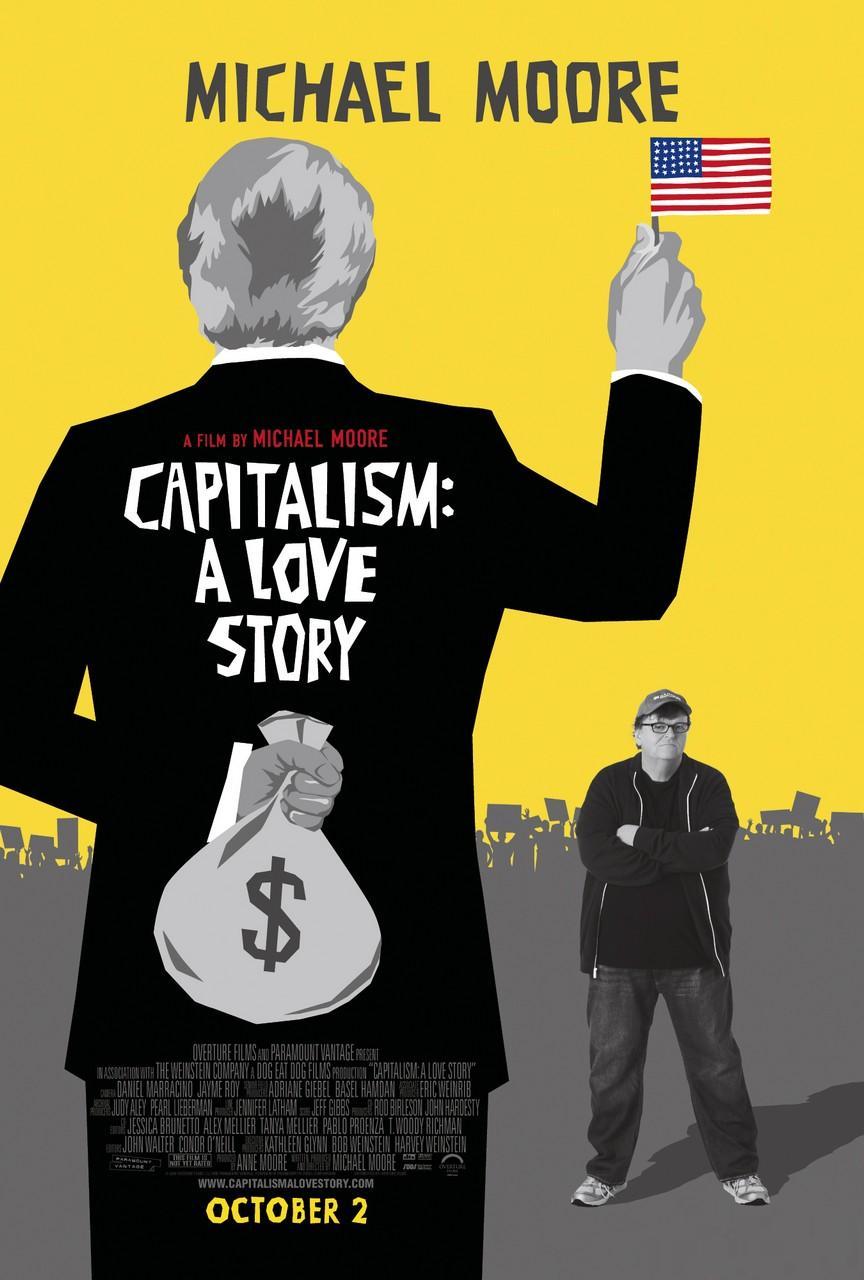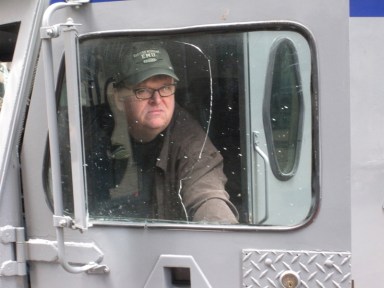 Did you know that one home is foreclosed every 7 1/2 seconds in the United States? Or that millions of unsuspecting Americans have secret life insurance policies taken out on them by the very companies they work for? If you didn’t, Michael Moore is here to tell you all about it in his new film Capitalism: A Love Story. So sit back and prepare for history class…
Did you know that one home is foreclosed every 7 1/2 seconds in the United States? Or that millions of unsuspecting Americans have secret life insurance policies taken out on them by the very companies they work for? If you didn’t, Michael Moore is here to tell you all about it in his new film Capitalism: A Love Story. So sit back and prepare for history class…
It’s been 20 years since Michael Moore burst onto the film scene with his first documentary, Roger & Me. Although his films have gotten bigger in budget and broader in scope, one thing hasn’t changed: Moore’s decisive uphill battle to point out what he perceives as the ills which face this country, and possible ways to correct them. All of this dedication comes to the fore in Capitalism: A Love Story, which details not just the history of capitalism itself, but how much the dream has changed from an idealistic vision that could have allowed us to live in a financial utopia, to a nightmarish quagmire that threatens to collapse our economy at any moment, based on the insatiable avaricious behavior of the 1% rich that unfortunately hold power over all of us.
Capitalism begins with the story of Randy and Donna Hacker, a working class couple who are having their home foreclosed due to lack of payment. Randy had been injured and unable to work sometime earlier, and so they quickly fell behind on bills. At times in Moore’s documentaries, the filmmaker’s mere presence can get greedy, heartless companies to acquiesce at the last moment, allowing the little guy to triumph for one more day…as he did with a man whose daughter needed two hearing aid implants, but his insurance company only wanted to pay for one, in 2007’s Sicko. Here however, Moore’s cameras can only film helplessly as the bank goes through with the foreclosure, and in an absolutely humiliating irony, Randy and Donna have no choice but to clean every last item out of the house and make sure it’s spotlessly livable for the next owners, in the hopes of earning a $1,000 cleaning fee from that same bank.
 As with all his works, that’s one of the things Moore does best in Capitalism: display the horrifying hypocrisy of the machine that drives this country, whether it be the insurance company that finally gives the little girl two cochlear implants simply because Moore’s in town, or the bank that figures it’s cheaper for them to pay Randy and Donna to clean out their own foreclosed home for the next owner, rather than hire a cleaning team and let the Hackers leave with some semblance of dignity.
As with all his works, that’s one of the things Moore does best in Capitalism: display the horrifying hypocrisy of the machine that drives this country, whether it be the insurance company that finally gives the little girl two cochlear implants simply because Moore’s in town, or the bank that figures it’s cheaper for them to pay Randy and Donna to clean out their own foreclosed home for the next owner, rather than hire a cleaning team and let the Hackers leave with some semblance of dignity.
Unfortunately for Moore, all of his films contain some hypocrisy as well. For a filmmaker who specializes in documentaries, he doesn’t always allow his silent camera to just capture the moment and let the viewer make their own informed choices; many times, Moore simply must put his own two cents in, just to make sure we get what he’s showing. It’s at the point where Moore’s filmmaking style has been parodied by others, most notably in the horridly unfunny An American Carol. However here in Capitalism, Moore does inject a few too many “I started to think,” “it made me wonder,” “and then I wondered” asides into the mix. All of this self-reference tends to break the viewer out of the visual narrative at inopportune moments, and it seems to me that he uses far more sad music cues to underscore his heartbreak moments than ever before. Perhaps it was because it is his 20th anniversary and he was in a blow-out mood, but this time he ends up often unintentionally parodying himself.
This is not to say that Capitalism: A Love Story is a failure in any way. It certainly isn’t, but it’s definitely not his best work. Part of the problem is that while the subject of capitalism–both its gains and losses–affects every one of us, that same subject is a snoozer to learn about, and no matter how many amusing film clips he interjects to help tell his story, Economics 101 always puts the class to sleep.
 Still, the film is his best researched effort, and it’s that rare film that is a necessity to see. As always, the tales Moore has to tell are terrifying: From the Pennsylvania jail that crookedly made money off the state by incarcerating teenagers for the merest infractions (such as two girls getting into an argument at the local mall) to the scumbag bank which made $1.5 million dollars from the life insurance policy it took out on an employee who died (money which the widow never saw a dime of), Capitalism: A Love Story is a tale of fearful ironies, as most of the classic love stories (i.e.: Romeo and Juliet) truly are. The type of policy which that bank took out is called a Dead Peasants insurance policy, by the way, and it’s not entirely illegal. Any corporation can secretly take out life insurance on its employees and name themselves the beneficiary, so that when the employee dies, the company is rewarded handsomely…while the grieving family has to make due with their plain ol’ joe shmoe policy. Some companies you may have heard of which have Dead Peasants policies: Bank of America, Wal-Mart, Hershey’s and others. Many of these companies keep records of how much money they make in relation to the number of employees who are courteous enough to die for them.
Still, the film is his best researched effort, and it’s that rare film that is a necessity to see. As always, the tales Moore has to tell are terrifying: From the Pennsylvania jail that crookedly made money off the state by incarcerating teenagers for the merest infractions (such as two girls getting into an argument at the local mall) to the scumbag bank which made $1.5 million dollars from the life insurance policy it took out on an employee who died (money which the widow never saw a dime of), Capitalism: A Love Story is a tale of fearful ironies, as most of the classic love stories (i.e.: Romeo and Juliet) truly are. The type of policy which that bank took out is called a Dead Peasants insurance policy, by the way, and it’s not entirely illegal. Any corporation can secretly take out life insurance on its employees and name themselves the beneficiary, so that when the employee dies, the company is rewarded handsomely…while the grieving family has to make due with their plain ol’ joe shmoe policy. Some companies you may have heard of which have Dead Peasants policies: Bank of America, Wal-Mart, Hershey’s and others. Many of these companies keep records of how much money they make in relation to the number of employees who are courteous enough to die for them.
Sadly, Michael Moore has no real answers on how we can fix capitalism. Perhaps that is because this time around, there are no readily tangible clues or solutions on how to fix the problem. Like all love stories that end badly, this country may simply be waiting quietly by the phone for the “let’s make up” call that will never come.
[kml_flashembed movie="http://www.youtube.com/v/JeROnVUADj0" width="600" height="344" allowfullscreen="true" fvars="fs=1" /]

![Reblog this post [with Zemanta]](http://img.zemanta.com/reblog_e.png?x-id=a42b9d03-411f-4008-b7d3-34035d5fb0cf)



Comments